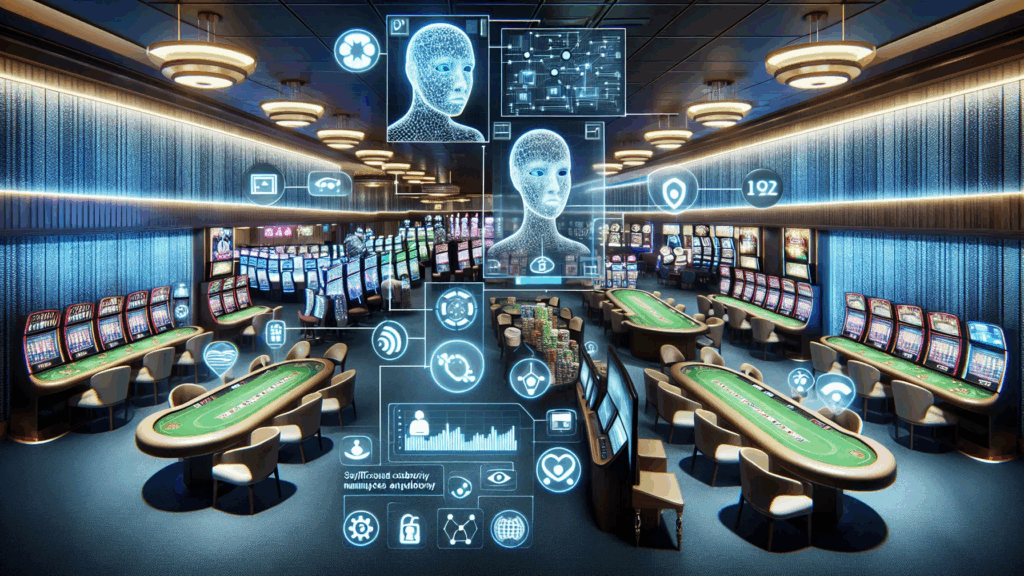
Behind the flashing lights and instant rewards of online casinos lies a growing concern—problem gambling. What begins as harmless entertainment can, for some, spiral into a ruinous habit. Traditional safeguards like self-exclusion programs and deposit limits typically kick in too late, after significant damage is done.
Enter artificial intelligence—the behind-the-scenes watchdog working tirelessly in the background. By analyzing player behavior in real time, AI can detect the very first warning signs of gambling harm, offering support before losses get out of hand. This isn’t so much a question of restricting players; it’s a question of protecting them.
How AI Finds Problem Gambling
Reading Between the Bets
AI programs don’t just track wins and losses—they observe how people gamble. By establishing a baseline behavior for each player, the algorithms can detect alarming deviations. A recreational player who suddenly increases their deposits tenfold, starts gambling at odd hours, or chases losses with reckless bets gives off warning signs. Unlike human moderators, AI never misses these subtle but important changes.
The Financial Telltale Signs
Money trails don’t lie. AI monitors deposit frequency, withdrawal patterns, and even changing payment methods. Somebody bumping up against daily limits, reversing withdrawals to keep on playing, or cycling through multiple payment sources is generally a bad sign. These financial fingerprints allow AI to step in before a player’s situation gets worse.

Beyond Numbers: Behavioral Clues
Real detection goes beyond transactional records. Advanced systems examine how people interact with games—desperate, wild betting after losses, marathon sessions with no break, or sudden switching to high-risk games. Some sites even analyze chat behavior for signs of desperation, like aggressive language or desperation messages.
The Balancing Act: Protection vs. Privacy
With great data comes great responsibility. The same AI that protects players also invades privacy. Critics argue that such intimate surveillance is intrusive, and false positives could unfairly restrict casual gamblers. The most ethical operators use these tools transparently, targeting only blatant risk factors rather than using behavioral insights for profits.
Responsible platforms strike a good balance—employing AI as a safety net, not a surveillance tool. When harm is detected, the appropriate response is proportionate: personalized reminders to take a break, temporary interruptions of play, or discreet links to support services. The goal isn’t to sanction but to prevent harm.
The Future of AI in Gambling Safety
AI’s role in gambling harm prevention is still evolving. Emerging technologies could integrate biometric data—imagine a system that detects increased heart rates or stress levels via wearable devices, suggesting breaks before impulsive bets are placed. Other innovations might use predictive modeling to identify at-risk players before problematic behavior emerges.
Platforms like Aviator 1xbet demonstrate how these tools can run in the background unobtrusively, protecting players without getting in the way of those who are gambling responsibly. As the technology becomes more advanced, AI could be the future norm of responsible gambling—a digital lifeline woven into the online casino framework.
Conclusion: A New Era of Responsible Gambling
The real breakthrough in online gambling regulation isn’t bigger jackpots or flashier games—it’s the quiet revolution in player safeguarding. AI delivers something that was hitherto impossible: the ability to detect and address gambling harm at its earliest inception.
For an industry long criticized for prioritizing profits over people, these intelligent systems are a turning point. They show that technology can be used for good, not by stopping gambling, but by ensuring it is always a choice and never a compulsion. In the end, the true measure of progress will not be in bottom-line numbers, but in how well the industry looks after its most vulnerable players.
The future of responsible gaming isn’t human or artificial intelligence—it’s both, working together to make it a safer place for everyone.













